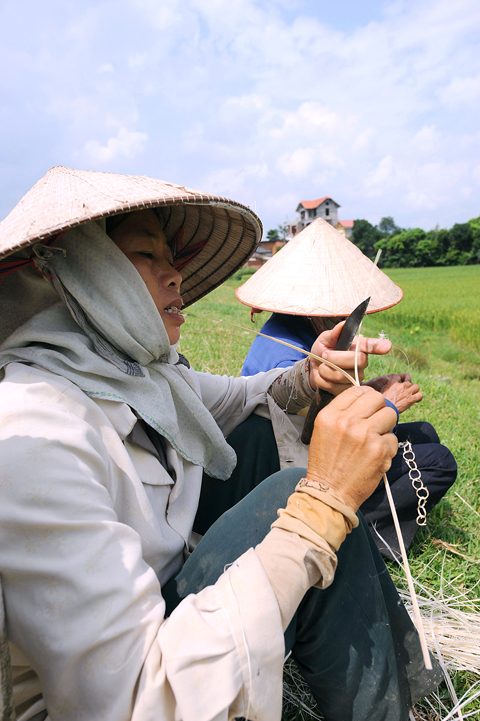Double-digit inflation and shocks from the global financial turmoil threaten to plunge Vietnamese households living on the margins back into dire poverty, the UN has warned.
Despite Vietnam’s economic boom of recent years, many groups remain vulnerable to food shortages — especially landless farmers, the urban poor and ethnic minority groups — UN resident coordinator John Hendra said.
While global commodity and energy prices have dropped back from their peaks this year, Vietnam’s inflation, although falling, still stood at 26.7 percent this month, squeezing the family budgets of the most marginalized groups.

PHOTO: AFP
On top of soaring consumer prices, Hendra said, the global financial crisis will likely impact Vietnam’s export-driven economy.
“Taken together, these economic challenges threaten to derail Vietnam’s progress in reducing poverty,” he said in a televised national address on Friday.
UN data showed that “less money is available to many Vietnamese households, especially poorer ones and there is a real risk some families could fall back below the poverty line, while those already there need additional help,” he said.
“Poorer women and children are particularly at risk since higher food prices can worsen their already precarious nutritional status,” he said.
Vietnam, which launched its doi moi (renewal or renovation) market reforms in the late 1980s, has seen more than a decade of economic growth above 7.5 percent, lifting tens of millions out of poverty.
The developing country of 86 million joined the WTO early last year and hopes to soon become a middle-income nation with annual GDP of US$1,000 per capita.
However, over the past year, Vietnam’s overheating economy has been hit by double-digit inflation and other economic woes. Especially high food and gasoline prices have hit the poor the hardest and fuelled social discontent.
Vietnam, the world’s No. 2 rice exporter, does not face overall food shortages, Hendra stressed in a separate speech last week.
But he warned that, while some farmers had benefited from high global food prices, more than half of Vietnamese households are net buyers of food and have seen their real purchasing power reduced.
Groups including low-skilled and landless rural workers and the elderly “are not only temporarily worse off but also challenged in their long-term ability to secure adequate intakes of food,” Hendra said.
Ethnic minorities faced the greatest risk, including in the Central Highlands and northwestern mountains, which already face “high poverty and moderate to severe stunting rates among children under five years.”
To address the problem, Hendra recommended that Vietnam strengthen its social security programs and its data collection on poverty to more precisely and quickly identify and help the most vulnerable groups.
He also warned of long-term threats to food security in industrializing Vietnam as agricultural areas face pressure from “a growing demand for land for industrial, residential, tourist and leisure purposes.”

SECURITY: As China is ‘reshaping’ Hong Kong’s population, Taiwan must raise the eligibility threshold for applications from Hong Kongers, Chiu Chui-cheng said When Hong Kong and Macau citizens apply for residency in Taiwan, it would be under a new category that includes a “national security observation period,” Mainland Affairs Council (MAC) Minister Chiu Chui-cheng (邱垂正) said yesterday. President William Lai (賴清德) on March 13 announced 17 strategies to counter China’s aggression toward Taiwan, including incorporating national security considerations into the review process for residency applications from Hong Kong and Macau citizens. The situation in Hong Kong is constantly changing, Chiu said to media yesterday on the sidelines of the Taipei Technology Run hosted by the Taipei Neihu Technology Park Development Association. With

A US Marine Corps regiment equipped with Naval Strike Missiles (NSM) is set to participate in the upcoming Balikatan 25 exercise in the Luzon Strait, marking the system’s first-ever deployment in the Philippines. US and Philippine officials have separately confirmed that the Navy Marine Expeditionary Ship Interdiction System (NMESIS) — the mobile launch platform for the Naval Strike Missile — would take part in the joint exercise. The missiles are being deployed to “a strategic first island chain chokepoint” in the waters between Taiwan proper and the Philippines, US-based Naval News reported. “The Luzon Strait and Bashi Channel represent a critical access

CARROT AND STICK: While unrelenting in its military threats, China attracted nearly 40,000 Taiwanese to over 400 business events last year Nearly 40,000 Taiwanese last year joined industry events in China, such as conferences and trade fairs, supported by the Chinese government, a study showed yesterday, as Beijing ramps up a charm offensive toward Taipei alongside military pressure. China has long taken a carrot-and-stick approach to Taiwan, threatening it with the prospect of military action while reaching out to those it believes are amenable to Beijing’s point of view. Taiwanese security officials are wary of what they see as Beijing’s influence campaigns to sway public opinion after Taipei and Beijing gradually resumed travel links halted by the COVID-19 pandemic, but the scale of

Pope Francis is be laid to rest on Saturday after lying in state for three days in St Peter’s Basilica, where the faithful are expected to flock to pay their respects to history’s first Latin American pontiff. The cardinals met yesterday in the Vatican’s synod hall to chart the next steps before a conclave begins to choose Francis’ successor, as condolences poured in from around the world. According to current norms, the conclave must begin between May 5 and 10. The cardinals set the funeral for Saturday at 10am in St Peter’s Square, to be celebrated by the dean of the College